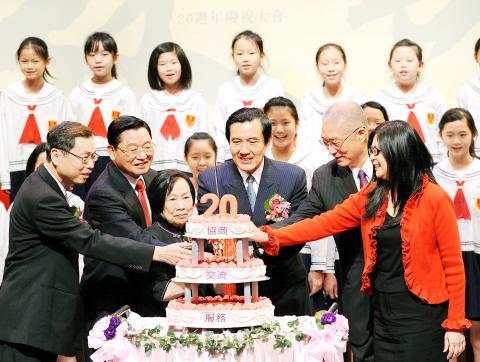President Ma Ying-jeou (馬英九) yesterday said he would make the people, peace and democracy the priorities in his efforts to develop cross-strait relations.
In the process of improving cross-strait relations and pursuing peace across the Taiwan Strait, Ma said, the government would defend the nation’s dignity and sovereignty under the Republic of China (ROC) Constitution.
“We will maintain the ‘status quo’ of no unification, no independence and no use of force, and push for cross-strait exchanges under the 1992 consensus,” he said at an event celebrating the 20th anniversary of the Straits Exchange Foundation (SEF), the semiofficial body used to hold negotiations with China.

Photo: Fang Pin-chao, Taipei Times
Ma said that based on their respective Constitutions, Taiwan and China did not recognize each other and that both sides of the Taiwan Strait addressed cross-strait issues based on the so-called “mutual non-denial” principle — the most important foundation for the realization of peace across the Strait.
“Mutual non-denial is probably the most important foundation that can explain the current cross-strait situation and lead to peaceful cross-strait relations,” he said. “All the political parties should recognize this political reality to create a new path for the 23 million people [of Taiwan].”
Ma first proposed the term “mutual non-denial” during his presidential campaign in 2007. He said that as long as China and Taiwan could agree on the meaning of mutual non-denial, they would -automatically refer to the so-called “1992 consensus.”
He said he would make the public’s interest a priority as the government pursues exchanges with China and that he would never sacrifice the nation’s dignity and sovereignty in the name of peace.
Ma also vowed to make the process of cross-strait negotiations as transparent as possible by reporting the results of negotiations to the legislature.
The president also presented a posthumous honorary award to former SEF chairman Koo Chen-fu (辜振甫) for his contributions in cross-strait relations. The award was accepted by his wife, Cecilia Koo (辜嚴倬雲).
In 1993, Koo and his Chinese counterpart, then-Association for Relations Across the Taiwan Strait chairman Wang Daohan (汪道涵), held historic talks in Singapore.
SEF Chairman Chiang Pin-kun (江丙坤) said cross-strait negotiations put the economy before politics and addressed easier issues. As negotiations enter a more difficult phase, the government would seek consensus with China on investment protection and dispute--settlement agreements in the next round of cross-strait talks, he said.

Chinese Nationalist Party (KMT) Chairman Eric Chu (朱立倫), spokeswoman Yang Chih-yu (楊智伃) and Legislator Hsieh Lung-chieh (謝龍介) would be summoned by police for questioning for leading an illegal assembly on Thursday evening last week, Minister of the Interior Liu Shyh-fang (劉世芳) said today. The three KMT officials led an assembly outside the Taipei City Prosecutors’ Office, a restricted area where public assembly is not allowed, protesting the questioning of several KMT staff and searches of KMT headquarters and offices in a recall petition forgery case. Chu, Yang and Hsieh are all suspected of contravening the Assembly and Parade Act (集會遊行法) by holding

PRAISE: Japanese visitor Takashi Kubota said the Taiwanese temple architecture images showcased in the AI Art Gallery were the most impressive displays he saw Taiwan does not have an official pavilion at the World Expo in Osaka, Japan, because of its diplomatic predicament, but the government-backed Tech World pavilion is drawing interest with its unique recreations of works by Taiwanese artists. The pavilion features an artificial intelligence (AI)-based art gallery showcasing works of famous Taiwanese artists from the Japanese colonial period using innovative technologies. Among its main simulated displays are Eastern gouache paintings by Chen Chin (陳進), Lin Yu-shan (林玉山) and Kuo Hsueh-hu (郭雪湖), who were the three young Taiwanese painters selected for the East Asian Painting exhibition in 1927. Gouache is a water-based

Taiwan would welcome the return of Honduras as a diplomatic ally if its next president decides to make such a move, Minister of Foreign Affairs Lin Chia-lung (林佳龍) said yesterday. “Of course, we would welcome Honduras if they want to restore diplomatic ties with Taiwan after their elections,” Lin said at a meeting of the legislature’s Foreign Affairs and National Defense Committee, when asked to comment on statements made by two of the three Honduran presidential candidates during the presidential campaign in the Central American country. Taiwan is paying close attention to the region as a whole in the wake of a

OFF-TARGET: More than 30,000 participants were expected to take part in the Games next month, but only 6,550 foreign and 19,400 Taiwanese athletes have registered Taipei city councilors yesterday blasted the organizers of next month’s World Masters Games over sudden timetable and venue changes, which they said have caused thousands of participants to back out of the international sporting event, among other organizational issues. They also cited visa delays and political interference by China as reasons many foreign athletes are requesting refunds for the event, to be held from May 17 to 30. Jointly organized by the Taipei and New Taipei City governments, the games have been rocked by numerous controversies since preparations began in 2020. Taipei City Councilor Lin Yen-feng (林延鳳) said yesterday that new measures by